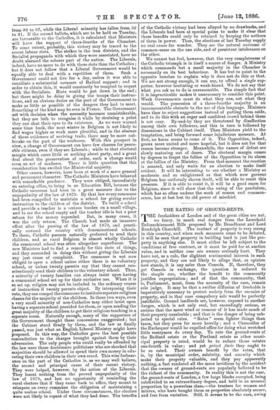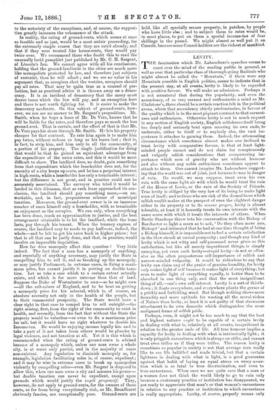THE RATING OF GROUND-RENTS.
THE freeholders of London and of the great cities are not, we fancy, in much real danger from the Leasehold
Enfranchisement Bills proposed by Mr. Broadhurst and Lord Randolph Churchill. The instinct of property is very strong in this country, and when such measures come to be debated, it will be seen that property in building land is just like pro- perty in anything else. It must either be left subject to the conditions of free contract, or it must be paid for at auction value, and in neither case are owners seriously hurt. They have not, as a rule, the slightest sentimental interest in such property, and they are not likely to allege that, as opinion now stands, it is any safer than Consols. If, therefore, they get Consols in exchange, the question is reduced to the simple one, whether the benefit to the community justifies expropriation ; and of that the community, that is, Parliament, must, from the necessity of the case, remain sole judge. It may be that a swifter diffusion of freeholds is imperatively necessary to protect society from the enemies of property, and in that case compulsory sale would be perfectly justifiable. Ground landlords are, however, exposed to another danger, which is not only real, but exceedingly serious, so serious that the mere wind or rumour of it has made much of their property unsaleable ; and that is the danger of being sub- jected to special rates. "Rates" seem lighter things than taxes, but they press far more heavily ; and a Chancellor of the Exchequer would be expelled office for doing what wretched little vestrymen do every day. To rate the ground-rents of the Bedford estate or the Portland estate as other muni-
cipal property is rated, would be to reduce those estates one-fourth in value ; and yet primes facie they ought to
be so rated. Their owners benefit by the rates, that is, by the municipal order, salubrity, and amenity which make their property valuable, and they pay apparently nothing, a fact rendered all the more invidious by the accident that the owners of ground-rents are popularly believed to be the richest of the community. In reality this is not the case, the ground-rents of London, a few large blocks excepted, being subdivided to an extraordinary degree, and held in an unusual proportion by a powerless class,—the trustees for women and minors, who have bought them as properties absolutely secure, and free from variation. Still, it seems to be the case, owing to the notoriety' of the exceptions, and, of course, the supposi- tion greatly increases the vehemence of the attack.
In reality, the rating of ground-rents, which seems at once so feasible and so just, would be a most unfair proceeding, for the extremely simple reason that they are rated already, and that if they were treated like house-rents, they would pay twice over. We recommend those who doubt this to read the unusually lucid pamphlet just published by Mr. C. H. Sargent, of Lincoln's Inn. We cannot agree with all his conclusions, holding that the ground-landlords in the cities are much more like monopolists protected by law, and therefore just subjects of restraint, than he will admit ; and we see no value in his argument that, as occupiers elect the vestries, occupiers should pay all rates. That may be quite true as a counsel of per- fection, but as practical advice it is thrown away on a demo- cracy. It is an incident of democracy that the many must decree taxes which the few will pay, and an exemption here and there is not worth fighting for. It is easier to make the democracy moderate. On this subject of ground-rents, how-
ever, we can see no answer to Mr. Sargent's propositions. Mr. Smith, when he buys a lease of Mr. De Vere, knows that he
will be liable for the rates, and therefore pays so much the less ground-rent. That is certain, and the effect of that is that Mr. De Vere pays his share through Mr. Smith. He lets his property cheaper for that contract. To rate him again is to make him pay twice, without redress so long as his leases last ; that is, in fact, to strip him, and him only in all the community, of a portion of his property. The single justification for doing that would be that he gained an equivalent advantage from the expenditure of the extra rates, and this it would be most difficult to show. The landlord does, no doubt, gain something from that expenditure which the leaseholder does not, for the amenity of a city keeps up rents, and he has a perpetual interest in high rents, while a leaseholder has only a terminable interest; but the difference is not great, and in practice could not be accurately ascertained. The surveyor who tried it would be landed in this dilemma, that as each lease approached its con- clusion, the landlord should pay something more,—an un- workable, and, in fact, preposterous scheme of municipal taxation. Moreover, the ground-rent owner is in an immense number of cases himself only a leaseholder, with as terminable an enjoyment as the occupier. We can only, when everything has been done, reach an approximation to justice, and the best arrangement attainable is to let the landlord, while the lease lasts, pay through his tenant. When the tenancy expires, of course, the landlord may be made to pay half—or, indeed, the whole—and be left to get his rates back in higher prices ; but that is all that can be justly done, and that, in practice, would involve an impossible inquisition.
How far does monopoly affect this question ? Very little indeed. The fact that a man has a monopoly of anything, and especially of anything necessary, may justify the State in compelling him to sell it, and so breaking up the monopoly, or may justify Parliament, in extreme cases, in fixing a maxi- mum price, but cannot justify it in putting on double taxa- tion. Let us take a case which to a certain extent actually exists, and which is far more extreme than that of land.
Suppose the Duke of Westminster to own—as he might own —all the salt-mines of England, and to be bent on getting
a monopoly price for his mineral, which is, of course, an absolute necessity not only to the health of the people, but to their commercial prosperity. The State would have a clear right in that case to compel him to sell outright—the right arising, first, from the right of the community to exist in health, and secondly, from the fact that without the State the property would be valueless—or even to fix a maximum price for salt, but it would have no right whatever to double his Income-tax. He would be enjoying income legally his, and to take a part of it not taken from others would be plunder by legal violence, and not taxation at all. Yet it is this which is recommended when the rating of ground-rents is advised because of a monopoly which, unless one man owns a whole city, is at worst only partial, and in the majority of cases non-existent. Any legislation to diminish monopoly as, for example, legislation facilitating sales is, of course, expedient ; and it may be wise in extreme cases to break up monopolies violently by compelling sales—even Mr. Sargent is disposed to allow this, when one man owns a city and misuses his power— but double taxation can never be expedient, except upon grounds which would justify the imp& progress/ They, however, do not apply to ground-rents, for the owners of those rents, so far from being exceptionally rich, as Mr. Broadhurst obviously fancies, are exceptionally poor. Ground-rents are
held, like all specially secure property, in patches, by people who have little else ; and to subject them to rates would be, in most places, to put on them a special income-tax of four shillings in the pound. We might almost as well put it on Consols, because some Consol-holders are the richest of mankind.



































 Previous page
Previous page